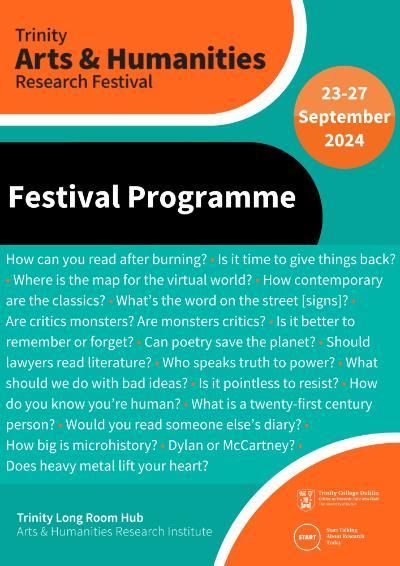
The Trinity College Arts and Humanities Research festival (that’s a lot of words) happened to take place the last week of September. Somehow, I finagled the responsibility of writing about the events in the festival. My experience goes as shown.
I was only given notice to report on the event after two days had passed with the festival. I don’t go to many academic talks and discussions. Suddenly, I was going to a lot of them. I felt like I was naked, afraid and in the presence of many pickpockets. From undisclosed sources, I learned that the festival was facilitated by the Trinity Long Room Hub. There was a wide variety of topics and conversations held by celebrated people to give them the platform to speak about what they were passionate about. My first event was with Wexford Opera and their speakers Rosetta Cucchu and Conor Hanratty. Others such as TUD professor Una Hunt joined for a discussion about composer Charles Stanford’s ‘The Critic.’ I had a difficult time getting to this event for reasons that definitely were not my fault. Initially, a very nice lady directed me. I followed her directions and then found another nice lady to tell me “the long room there is actually over there, love”. And so I followed her directions and then ended up in the Trinity catacombs. After some aimless and frustrated wandering, the long room hub was the building next to where I had arrived. As I went inside, excited to see an opera, I wondered how they could do an opera in a conference room. My answers were delivered when I saw that it was a discussion about opera. I almost up and left, but decided for my journalist duties to stay and gather some intel.
The events later in the week got easier to find and were therefore more enjoyable. Professors Mark Faulkner (English) and Nicole Volmering (History) and some others spoke about how writing affects and is affected by city dwellers. It explored the question of how the metropolitan person creates a message, and how they go about expressing it. Even more events spoke about the most interesting topics such as Nicole Grimes (Music) who spoke about female composers and their role within music, past, present, and future. Balazes Apor (Trinity Centre for Resistance Studies) shared research on the impact of non-conformist punk songs and modern politics. One of the best events was the Long Table discussion examining the question “what it means to be a 21st Century person”. The absurdity of getting a random assortment of knowledgeable people to sit down and speak about such a topic was fairly amusing, and they gave away free tangerines. I still regret not taking a biscuit as I left.
From a very professional point of view, I enjoyed the event overall. From a very personal point of view, I feel asleep sometimes. I found myself with the inescapable feeling that some of the people who attended such events were paid by some unknown contributor. I also felt tangled up and conflicted with the idea of a certain class of people coming together to speak upon broad topics without actually reaching out to the people who these topics were about. To be frank, there was a good bit of academic chicken choking that superseded every presentation on stage. However, no matter how gooey and slippery, the festival itself provided the platform for people to speak and engage to a larger audience of not only colleagues, but other professionals, students, and members of the public. On top of passion, these were areas of research and
theory that had so much potential to impact the world. At the end of the day, even if it’s the academic elite circling around Trinity College as the only group that talks about the lack of recognition of female composers, or punk music in post Soviet Hungary, the ability to create ways for people to come together, discuss what they think (even if it’s a tad bit boring), is something so innately human and quite impossible nowadays. The festival tried that, sort of did that, but, truly, has given the possibility for more events like it to come.






